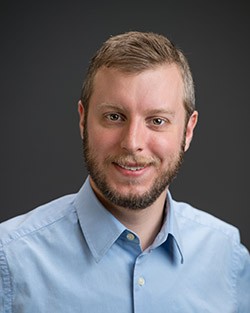Joseph Toscano, PhD, Receives Prestigious CAREER Grant from National Science Foundation

VILLANOVA, Pa. – Joseph Toscano, PhD, an assistant professor of Psychological and Brain Sciences in Villanova University’s College of Liberal Arts and Sciences, has received a five-year, $605,000 Faculty Early Career Development (CAREER) Program award from the National Science Foundation (NSF).
Dr. Toscano, an expert in human speech recognition and language comprehension, will investigate how people understand spoken language in different contexts by studying brain responses to speech and developing computer models that recognize spoken words.
Since 2017, six Villanova faculty members have received NSF CAREER Awards, the most prestigious award supporting career-development activities for teacher-scholars who most effectively integrate research and education within the context of the mission of their organization. In addition to Dr. Toscano, Troy Shirangi, PhD (assistant professor of Biology), Wenqing Xu, PhD (assistant professor of Civil and Environmental Engineering), Jacob Elmer, PhD (assistant professor of Chemical Engineering), Janette Herbers, PhD (assistant professor of Psychological and Brain Sciences) and Edward Kim, PhD (former assistant professor, Computing Sciences) have been recipients of CAREER awards.
“I’m extremely honored to receive this grant to further our research on language processing,” said Dr. Toscano. “Our goal is to provide insights into the neuroscience of speech perception and help us understand how we can build computer systems that process language in ways similar to humans.”
Dr. Toscano will integrate an educational component into the project, providing Villanova undergraduate and graduate students with training in advanced computational and neuroscience techniques.
Language is involved in nearly every aspect of our daily lives, but researchers do not fully understand how the brain transforms sounds into meaningful words. As part of their research, Dr. Toscano and his students will measure brain responses occurring in the first few hundred milliseconds after hearing a sound. By studying these early brain responses, they hope to determine how a listener’s expectation influences their perception.
“For example, if we hear the sentence ‘They took the dog for a walk in the…’, we expect the next word to be ‘park,’ even if that word is obscured by noise or is ambiguous between ‘park’ and ‘bark,’ Dr. Toscano says. “We will be able to identify what information the listener uses to form these expectations, allowing them to quickly and accurately understand spoken language.”
The research team will also create neural network models that use techniques from machine learning to recognize speech and are trained in a way that mimics how children learn language. The behavior of the model will be compared with data from human listeners to determine whether it captures the way the brain understands spoken language and whether it forms the same kinds of expectations as listeners.
The techniques developed from this research will also be used in classroom and laboratory settings to train undergraduate and graduate students. This includes students in Dr. Toscano’s Mendel Science Experience course, one of several courses offered by the College of Liberal Arts and Sciences that provides laboratory experience for non-science majors. Students will learn to use the same techniques used by researchers in the lab, giving them a unique educational experience and a strong background in the scientific process.
About Villanova University’s College of Liberal Arts and Sciences: Since its founding in 1842, Villanova University’s College of Liberal Arts and Sciences has cultivated knowledge, understanding and intellectual courage for a purposeful life in a challenging and changing world. With 39 majors across the humanities, social sciences and natural sciences, it is the oldest and largest of Villanova’s colleges, serving more than 4,500 undergraduate and graduate students each year. The College is committed to a teacher-scholar model, offering outstanding undergraduate and graduate research opportunities and a rigorous core curriculum that prepares students to become critical thinkers, strong communicators and ethical leaders with a truly global perspective.
About Villanova University: Since 1842, Villanova University’s Augustinian Catholic intellectual tradition has been the cornerstone of an academic community in which students learn to think critically, act compassionately and succeed while serving others. There are more than 10,000 undergraduate, graduate and law students in the University's six colleges—the College of Liberal Arts and Sciences, the Villanova School of Business, the College of Engineering, the M. Louise Fitzpatrick College of Nursing, the College of Professional Studies and the Villanova University Charles Widger School of Law. Ranked among the nation’s top universities, Villanova supports its students’ intellectual growth and prepares them to become ethical leaders who create positive change everywhere life takes them. For more, visit www.villanova.edu.
